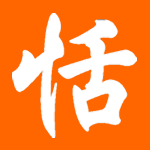According to the magazine, English translation for #6 is:
"English used to be the dominant language. Crazy, huh?"
Dr. Mair and I both noticed the printed Chinese is not correct.
统治语言 (dominate language), is two English phrases spliced together with an odd sense of colonialism. 官方語言 (official language) or 國際語言 (international language) would be better fitting.
疯狂 does not have the same contextual meaning as "crazy", rather "frenzied, unbridled; insane". In this case, a better phrase would be "傻不傻", or "isn't that silly?"
Perhaps this is a nod to Firefly, where mixture of Chinese Mandarin phrases were added into the show's dialogue.
Related: http://www.tian.cc/2007/08/wired-magazine-does-anyone-here-speak.html


You are assuming a present reading of what may be said in a future United States - one which might well carry with it some grammarisms and turns-of-phrase that are currently unknown in any Chinese language (just as many patois and dialects of English carry in them forms of the language unknown in other parts of the English-speaking world).
ReplyDeleteIn fact, an interesting case of this in English can be seen in the many examples provided in the book Prodigal Tongue: Dispatches from the Future of English by Mark Abley.
Also, the cases in the short-lived science fiction drama Firefly of horribly spoken wisps of Mandarin Chinese by the characters is another instance of how a language - when uprooted from its cultural context - might change dramatically (although the example of Firefly is a lot more fanciful than the examples provided by Abley).
Hakseng said:
ReplyDeleteTry this: type "English used to be the dominant language. Crazy, huh?"
into yahoo's babelfish - guess what you get? Exactly :-)
Babelfish, Google Translate....things NOT to take as a reference when translating. You might get the meaning somehow, it's enough to get a glance at the phrase, but don't ever publish the translations by them.
ReplyDeleteThat reminds me of two Slashdot posts, one said (in pinyin, because of Slashdot's incompatibility with encodings other than cp1252) that one of the most popular phrases of the future would be "Can I ride your rocket?" Someone replied with “不可以。我们做所有你们的东西。”
ReplyDeleteI like WIRED but they don't do fact-checking very well sometimes. Aside from the poor Chinese in this sample and in a previous issue where they had a mini-phrasebook, I've seen them screw up biology facts.
ReplyDelete